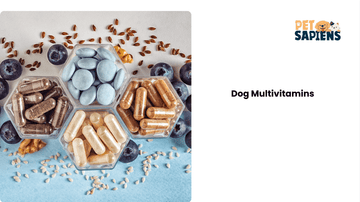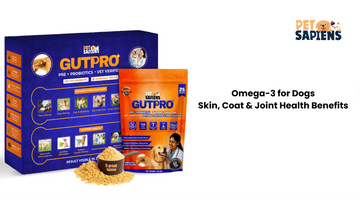How to Choose the Best Joint Supplements for Dogs: Ingredients, Dosage & Vet Advice
by Nitish kajala on Oct 10, 2025

As our beloved canine companions age, maintaining their mobility and joint health becomes increasingly important. Joint supplements have become a cornerstone of preventive care for dogs, helping to support cartilage health, reduce inflammation, and improve overall quality of life.
Whether you have a senior dog showing signs of stiffness or an active breed prone to joint issues, understanding how to choose the right supplement can make a significant difference in your pet's comfort and wellbeing.
Understanding Canine Joint Health
Dogs rely on healthy joints for everything from running and playing to simply getting up from their bed. Each joint consists of bones, cartilage, synovial fluid, and connective tissues working together to provide smooth, pain-free movement.
Over time, normal wear and tear, genetics, obesity, or previous injuries can compromise joint function, leading to conditions like osteoarthritis, hip dysplasia, or general joint degeneration.
The good news is that joint supplements can play a vital role in supporting joint health throughout your dog's life. These supplements work by providing the building blocks necessary for cartilage repair, reducing inflammation, and promoting healthy synovial fluid production.
While they're not a cure for severe joint disease, they can significantly slow progression and improve your dog's comfort level.
Key Ingredients to Look For
When evaluating joint supplements for your dog, understanding the science behind key ingredients helps you make informed decisions. Here are the most important components to consider:
Glucosamine
Glucosamine is perhaps the most well-known joint supplement ingredient, and for good reason. This naturally occurring compound is a fundamental building block of cartilage and plays a crucial role in maintaining joint structure. Glucosamine helps stimulate the production of glycosaminoglycans and proteoglycans, which are essential components of healthy cartilage.
There are two primary forms of glucosamine used in pet supplements: glucosamine hydrochloride and glucosamine sulfate.
Both forms are effective, though some studies suggest glucosamine sulfate may be slightly more bioavailable. Look for supplements containing between 20-30 mg per pound of body weight as a standard daily dose.
Chondroitin Sulfate
Chondroitin sulfate works synergistically with glucosamine to support joint health. This compound helps prevent the breakdown of cartilage by inhibiting destructive enzymes while also attracting fluid into the cartilage matrix, which improves shock absorption and nutrient delivery. The combination of glucosamine and chondroitin has been extensively studied and is considered the gold standard in joint supplementation.
The typical recommended dosage for chondroitin is approximately 15 mg per pound of body weight daily. When combined with glucosamine, these two ingredients provide comprehensive support for cartilage health and joint function.
Methylsulfonylmethane (MSM)
MSM is an organic sulfur compound known for its anti-inflammatory and pain-relieving properties. Sulfur is essential for the formation of collagen and connective tissue, making MSM particularly valuable for dogs with joint discomfort. Many pet owners report noticeable improvements in their dog's mobility and comfort levels when MSM is included in their joint supplement regimen.
This ingredient also helps reduce oxidative stress in joints and may improve the effectiveness of glucosamine and chondroitin. Typical dosages range from 50-100 mg per pound of body weight, though your veterinarian may recommend adjustments based on your dog's specific needs.
Omega-3 Fatty Acids
Omega-3 fatty acids, particularly EPA (eicosapentaenoic acid) and DHA (docosahexaenoic acid), offer powerful anti-inflammatory benefits for dogs with joint issues. These essential fatty acids help modulate the inflammatory response in joints, potentially reducing pain and stiffness. Fish oil is the most common source of omega-3s in pet supplements, though krill oil and algae-based options are also available.
For joint health support, aim for supplements providing approximately 50-100 mg of combined EPA and DHA per pound of body weight daily. The anti-inflammatory effects of omega-3s complement the cartilage-supporting actions of glucosamine and chondroitin beautifully.
Hyaluronic Acid
Hyaluronic acid is a naturally occurring substance in synovial fluid that acts as a lubricant and shock absorber in joints. As dogs age, their natural production of hyaluronic acid decreases, potentially contributing to joint stiffness and discomfort. Supplementing with hyaluronic acid can help maintain proper joint lubrication and support cartilage health.
This ingredient is particularly beneficial for dogs with degenerative joint disease or those recovering from joint injuries. Look for supplements containing 2-10 mg of hyaluronic acid per serving, depending on your dog's size.
Green-Lipped Mussel Extract
Green-lipped mussel extract is a natural source of multiple beneficial compounds, including omega-3 fatty acids, glucosamine, chondroitin, and unique anti-inflammatory substances. This ingredient has gained popularity in recent years due to its comprehensive joint-supporting properties and natural origin.
Research suggests that green-lipped mussel extract may be particularly effective at reducing inflammation and improving mobility in dogs with osteoarthritis. Typical dosages range from 15-30 mg per pound of body weight.
Turmeric and Curcumin
Turmeric, and specifically its active compound curcumin, has potent anti-inflammatory and antioxidant properties. This natural ingredient can help reduce joint inflammation and pain while supporting overall joint health. However, curcumin has poor bioavailability on its own, so look for supplements that include black pepper extract (piperine) to enhance absorption.
The recommended dosage of turmeric for dogs is typically 15-20 mg per pound of body weight, though supplements with enhanced bioavailability may require lower doses.
Determining the Right Dosage
Proper dosing is critical for joint supplements to be effective. Underdosing may provide minimal benefits, while overdosing can lead to digestive upset or other side effects. Most joint supplements provide dosing guidelines based on your dog's weight, but several factors should influence your final decision:
Body Weight: This is the primary factor in determining dosage. Small dogs under 25 pounds will require significantly less than large or giant breeds weighing 75 pounds or more. Always start with the manufacturer's weight-based recommendations as a baseline.
Severity of Joint Issues: Dogs with severe arthritis or significant joint degeneration may benefit from doses at the higher end of the recommended range, while those using supplements preventively might do well with standard doses.
Age and Activity Level: Senior dogs and highly active working or sporting dogs may require higher doses to adequately support their joints. Puppies of large or giant breeds may also benefit from joint supplements to support proper development, though dosing should be conservative and vet-approved.
Other Medications: If your dog is taking NSAIDs or other medications for joint pain, consult your veterinarian about appropriate supplement dosing to avoid potential interactions or redundancies.
Loading Dose vs. Maintenance Dose: Many joint supplements recommend a loading phase with higher doses for the first 4-6 weeks, followed by a reduced maintenance dose. This approach helps build up beneficial compounds in the joints more quickly.
Forms and Administration
Joint supplements for dogs come in various forms, each with its own advantages:
Chewable Tablets: These are the most popular form, often flavored to appeal to dogs. They're convenient, easy to dose accurately, and most dogs accept them readily as treats.
Soft Chews: Similar to treats in texture and taste, soft chews are highly palatable and easy for dogs with dental issues to consume.
Powders: These can be mixed into your dog's food and are ideal for picky eaters who won't take pills. They also allow for very precise dose adjustments.
Liquids: Easy to administer and often have high bioavailability. Liquids can be added to food or given directly by mouth.
Capsules: While less palatable, capsules can be opened and mixed with food if needed. They're often used for supplements with less appealing tastes.
Choose a form that fits your dog's preferences and your lifestyle. Consistency is more important than the delivery method, so select a format you can reliably administer daily.
The Importance of Quality and Third-Party Testing
Not all joint supplements are created equal. The pet supplement industry is less regulated than human pharmaceuticals, making it essential to choose products from reputable manufacturers. Here's what to look for:
Third-Party Testing: Seek supplements that have been tested by independent laboratories to verify ingredient purity, potency, and absence of contaminants. Look for certifications from organizations like NASC (National Animal Supplement Council) or similar quality assurance programs.
Transparent Labeling: Quality manufacturers clearly list all active and inactive ingredients, along with their amounts. Avoid products with proprietary blends that don't disclose specific ingredient quantities.
Manufacturing Standards: Look for products made in facilities that follow Good Manufacturing Practices (GMP) and have proper quality control measures in place.
Research-Backed Formulations: The best supplements base their formulations on peer-reviewed research and clinical studies demonstrating efficacy.
Batch Tracking: Reputable companies can trace each batch of supplements and provide certificates of analysis upon request.
When to Start Joint Supplements
The timing of joint supplementation can significantly impact its effectiveness. Here are key considerations for when to begin:
Preventive Care for At-Risk Breeds: Large and giant breed dogs, as well as breeds prone to hip dysplasia or joint issues (German Shepherds, Labrador Retrievers, Golden Retrievers, Rottweilers), may benefit from starting supplements as early as 1-2 years of age. This proactive approach can help protect cartilage before significant damage occurs.
Senior Dogs: Most dogs begin showing signs of joint wear around 7-8 years of age, though this varies by size. Starting supplements when your dog enters their senior years, even before obvious symptoms appear, can help maintain joint health.
After Injury or Surgery: If your dog has experienced a joint injury or undergone orthopedic surgery, your veterinarian may recommend supplements to support healing and prevent future problems.
Early Signs of Joint Issues: Watch for subtle indicators like reluctance to climb stairs, decreased playfulness, stiffness after rest, or difficulty getting up. These early signs are ideal times to begin supplementation.
Veterinary Guidance and Monitoring
While many joint supplements are available over the counter, consulting with your veterinarian is invaluable. Your vet can provide personalized recommendations based on your dog's specific health status, breed predispositions, and any existing conditions.
Initial Consultation: Before starting any supplement regimen, have your dog examined to establish a baseline of joint health. Your vet may recommend X-rays or other diagnostics to assess the current state of the joints.
Monitoring Progress: Schedule follow-up appointments every 3-6 months to evaluate how your dog is responding to supplements. Keep notes on mobility improvements, activity levels, and any changes in behavior that might indicate reduced pain.
Combination Therapies: Your veterinarian can help you develop a comprehensive joint health plan that may include supplements, weight management, physical therapy, pain medications, or other interventions as needed.
Safety Considerations: Some dogs may have allergies or sensitivities to certain ingredients. Your vet can help identify potential concerns and recommend alternatives if adverse reactions occur.
Integrating Supplements with Overall Joint Care
Joint supplements work best as part of a comprehensive approach to maintaining your dog's mobility and comfort:
Weight Management: Excess weight places tremendous stress on joints. Maintaining a healthy body condition can significantly reduce joint pain and slow the progression of arthritis.
Regular Exercise: Moderate, consistent exercise helps maintain muscle strength, which supports joints. Activities like swimming are particularly beneficial as they're low-impact while building strength.
Physical Therapy: Techniques like massage, stretching, and therapeutic exercises can complement supplements by improving flexibility and reducing stiffness.
Comfortable Sleeping Areas: Orthopedic beds with memory foam provide cushioning and support, reducing pressure on painful joints during rest.
Environmental Modifications: Ramps, steps, and non-slip surfaces help dogs navigate their homes more safely and comfortably.
Understanding Realistic Expectations and Timelines
Joint supplements are not miracle cures, and setting realistic expectations is important. Most dogs require 4-8 weeks of consistent supplementation before noticeable improvements appear. Some dogs may show dramatic improvements in mobility and comfort, while others experience more modest benefits.
Supplements work best for mild to moderate joint issues and as preventive care. Dogs with severe arthritis or advanced joint degeneration may require additional interventions beyond supplements alone. However, even in advanced cases, supplements can still provide meaningful support as part of a multi-modal treatment approach.
Supporting Your Dog's Nutritional Foundation
While specialized joint supplements play an important role, overall nutritional health provides the foundation for joint wellness. High-quality complete nutrition ensures your dog receives all the essential vitamins, minerals, and nutrients needed for optimal health.
Products like comprehensive daily nutrition supplements can fill nutritional gaps and support your dog's overall wellbeing, creating an ideal environment for joint health. Similarly, maintaining digestive health with probiotic supplements ensures your dog can properly absorb and utilize all the beneficial compounds in their joint supplements.
Making Your Decision
Choosing the best joint supplement for your dog involves balancing several factors: ingredient quality, appropriate dosing, your dog's specific needs, and practical considerations like palatability and price. Start by identifying supplements with proven ingredients like glucosamine, chondroitin, and MSM, then refine your choices based on additional beneficial compounds like omega-3s and natural anti-inflammatories.
Read reviews from other pet owners, but remember that individual responses vary. What works brilliantly for one dog may be less effective for another. Be prepared to give supplements adequate time to work and don't hesitate to try a different formulation if you don't see results after 8-12 weeks.
Conclusion
Joint health is a crucial aspect of your dog's quality of life, affecting everything from their ability to play and exercise to their overall comfort and happiness. The right joint supplement, chosen thoughtfully and used consistently, can make a meaningful difference in supporting your dog's mobility throughout their life.
By focusing on high-quality ingredients, appropriate dosing, and integrating supplements into a comprehensive care plan that includes proper nutrition, weight management, and regular veterinary care, you're giving your dog the best possible chance at maintaining healthy, comfortable joints for years to come.
Remember that every dog is unique, and what works best may require some trial and adjustment. Partner with your veterinarian, stay observant of your dog's responses, and remain committed to their long-term joint health. Your faithful companion depends on you to make informed decisions about their care, and with the right approach to joint supplementation, you can help ensure they remain active, comfortable, and happy throughout their golden years.


